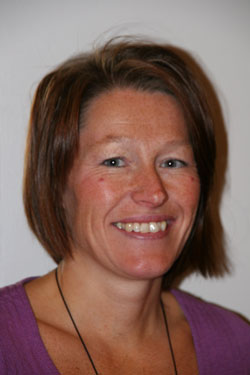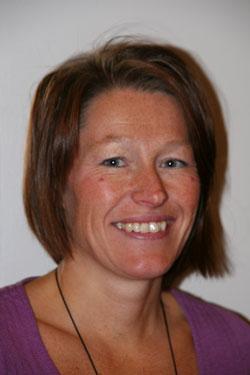A useful start
The start package was not a lifesaver, but it has given professor Heidi C. Dreyer the opportunity to work towards her long-term goals.

"Basically, I am against women receiving special treatment, but since the resources were made available to me it was extremely helpful to make use of them," says professor Hilde C. Dreyer, of the Department of Production and Quality Engineering at the Norwegian University of Science and Technology (NTNU). She is qualified both in business administration and as an engineer, and she works on the logistics of value chains, – how to achieve the most efficient flow of goods and information.
When Dreyer became a professor last year, she was the first permanently employed woman in the department. And she is still one of only a few. Dreyer’s department is part of the Faculty for Engineering Science and Technology, where women make up 4.6 per cent of the staff. It is the largest of the technology faculties at NTNU and also is the one with the lowest proportion of women on its staff.
Important Tools
As a member of staff at a department with very few women Hilde C. Dreyer was eligible to apply for NTNU’s start package for newly appointed female associate professors and full professors. A start package comprises money for equipment, running costs and for paying wages, and it is available for woman employed in departments where women make up less than 10% of the staff.
The money will come in useful, because research in technology and the natural sciences is more expensive than research in other areas, while the institutes have limited research funds at their disposal.
"I had spent several years on post-doctoral work before I was given a professorship, but nevertheless I discovered there was much to learn when I started work as a professor," Dreyer explains.
It was the departmental administrator who tipped her off about the start package, and after due consideration Dreyer submitted her application.
"I was fortunate in that the application was successful. It was important to have the means at my disposal to build networks, to publish and to participate in other activities that I considered important to my own professional development. Ordinarily, one has to compete with all the other departments for the same pot of money. As a newly appointed member of the staff it takes time to generate a sufficient volume of research activity in relation to financing."
Building networks
From April this year Dreyer has had a start package of NOK 300 000 (€ 36 350) at her disposal. She says that with this pot of money she can plan her work and realize the completion of both short-term and long-term projects. These means have freed her from the pressure of finding finance from other sources, and she has used the money to pay for research assistance, publishing and to attend conferences.
Looking forward, the next important task for Dreyer is to build networks, and the opportunity of initiating and leading a research project – in collaboration with her network contacts. Collaborating with other researchers in the logistics community at NTNU she has written an application for a project at St. Olavs Hospital in Trondheim. Next year, she will probably take a study period in Scotland. This will not only help her academic development but will also strengthen her English.
"For me it is important to develop an international network by participating in conferences and research projects, in order to get to know researchers working in the same field. Today, we are dependent upon an international network."
Recruiting students
Even though Hilde C. Dreyer belongs to a faculty with a low female membership, this year she can be pleased that 30% of the new intake of students are girls. This represents an increase of more than ten per cent. Nevertheless, many girls drop out of this type of subject. Dreyer is concerned with recruiting new students and wants to use some of her start package funds to this end.
"Developing and improving subjects make them more attractive to students. I believe, too, that active recruitment is important, by being present in the fora that the students and especially the girls are, at events and introduction courses."
Dreyer does not believe that girls and boys need to be recruited or treated any differently or that girls’ study progression needs to be adapted. However, it has become the culture that the humanities and social sciences have a high proportion of girls, while the boys dominate natural sciences. In her opinion, this is a culture that needs to be changed.
No lifesaver
The gender equality financing from NTNU has been of practical help to a professor in her initial period in the job, but is has not been vital.
"I would have obtained the resources necessary for my projects and plans through other means, but it would have taken longer. The job of obtaining financing will have been more piecemeal and fragmented, and my work would have been more dependent on when I had the means. In my current situation my work is goal oriented and long-term. The start package is an important means for getting started with plans and ambitions, which is good both for me and the academic community around me."
A boost to self-confidence
Feedback to the equal opportunities adviser at NTNU, Svandis Benediktsdottir, has shown that the start package is important.
"Many tell me that the start package gave them the boost they needed, that it gives them self-confidence. In many of the applications the women write that they have tried all the other possibilities, and that the start package was the last solution. It can be very tough establishing yourself as new researcher. To be a young woman in a male dominated environment increases the strain," she says and adds:
The hope is that the start package can be a means of increasing the proportion of women in certain academic fields. The sum the researchers receive is also important because the disciplines with a low proportion of women are in technology, and these demand financial resources, to, for example, establish a lab or obtain expensive technical equipment. Researchers in this area therefore need more money for their work than those at other faculties.
And at NTNU they believe in the efficacy of the packages. The pot available for the start packages has increased considerably in recent years – in three years NOK 3.8 million (€ 466 000) has been divided among 14 women.
"NTNU wishes to profile the expertise of its female researchers and invest in their skills. The start package shows that we value the academic expertise of all of those who work here," concludes Benediktsdottir.
The start packages at NTNU would make it easier for newly appointed women to establish themselves as researchers and to remain in their jobs. The female associate professors and professors recruited in 2002 and after are encouraged to apply. The only condition is that they work at an institute with a lower proportion of women in academic positions than ten per cent. They can apply for funds towards operations and equipment and towards wages for research assistance. Two important criteria in order for an application to be successful are the applicant’s research related needs, and how this might assist in the recruitment and retention of women in academic positions. In three years NOK 3.8 million (€ 466 000) has been divided between 14 women.
Figures for 2005 showed that among permanent academic positions at NTNU the proportion of women is 22.1 per cent. Within 2010 the figure should be 30 per cent, and within 2020 the target is to have real gender equal – in other words at least a 40 per cent representation of both sexes. The 2005 status shows that the Faculty of Arts is currently “top of the class” with 36,3 per cent, while the Faculty of Engineering Science and Technology faces an uphill struggle to improve its low 4.6 per cent women. Of seven faculties only three have a proportion of female permanent academic staff above 20 per cent. The faculties have developed strategies to improve gender equality among NTNU’s permanent academic staff.
